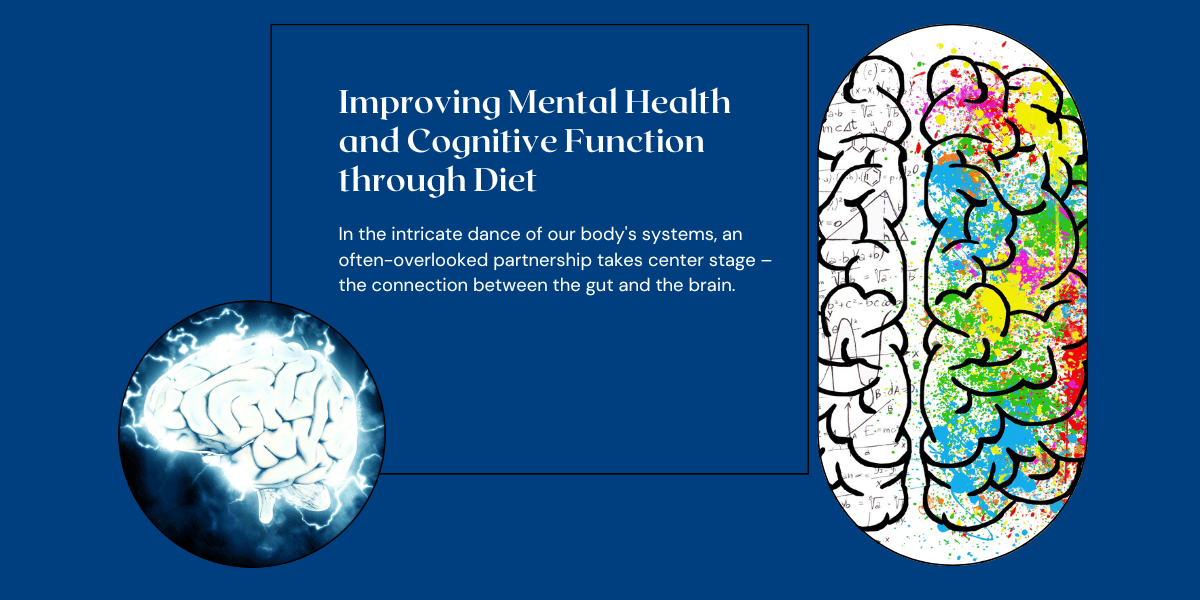Gut-Brain Connection: How Diet Impacts Mental Health and Cognitive Function?
Nourishing the Mind: Unraveling the Intricate Link Between Diet and Brain Health
Gut-Brain Connection
In the intricate dance of our body’s systems, an often-overlooked partnership takes center stage – the connection between the gut and the brain. As research delves deeper into the complexities of the gut-brain axis, a compelling narrative emerges: what we eat profoundly influences not just our physical well-being but also the health of our mind. Join us on an exploration into the world of the gut-brain connection, where the foods we choose become the architects of mental resilience, cognitive function, and emotional balance.
I. The Gut-Brain Axis: A Symbiotic Relationship
Embark on a journey into the fascinating world of the gut-brain axis, unraveling the intricate communication network between the gastrointestinal tract and the brain. Understand the role of the microbiome – the diverse community of microorganisms residing in our gut – in shaping mental health. Examine how signals affect mood, stress response, and cognitive functions as they move in both directions along this axis. Peer into the scientific discoveries that underscore the importance of a harmonious gut-brain relationship for overall well-being.
II. Nutrients for Neurons: The Impact of Diet on Cognitive Function
Dive deep into the realm of nutritional neuroscience, exploring how the foods we consume directly influence brain health and cognitive function. Examine the role of key nutrients – from omega-3 fatty acids to antioxidants – in supporting neural pathways, synaptic plasticity, and memory formation. Find out how eating habits like the Mediterranean diet might lower the risk of neurodegenerative disorders and promote cognitive resilience. Delve into practical dietary strategies to enhance brain function throughout the lifespan.
III. Gut Microbiota: Guardians of Mental Well-Being
Explore the pivotal role of the gut microbiota in regulating mental health and emotional balance. Understand how the composition of gut bacteria affects neurotransmitter production, inflammation, and stress response. Examine the emerging field of psychobiotics, exploring how specific probiotics can positively influence mood and alleviate symptoms of mental health disorders. Delve into the impact of prebiotics, dietary fibers that nourish beneficial Gut-Brain Connection bacteria, in supporting mental well-being. Gain insights into the interplay between the gut microbiome, the immune system, and the brain.
IV. Beyond the Plate: Lifestyle Factors and Mental Resilience
Recognize the holistic approach required for optimal mental health, extending beyond diet to lifestyle factors. Explore the influence of sleep, physical activity, and stress management on the gut-brain connection. Understand the bidirectional relationship between mental health and Gut-Brain Connection function, where stress can impact digestion, and digestive health can influence stress response. Discover mindfulness and relaxation techniques as powerful tools for promoting gut-brain harmony and emotional well-being.
V. Dietary Patterns and Mental Health: A Global Perspective
Examine the impact of diverse cultural diets on mental health across the globe. Explore how traditional dietary patterns, such as the Japanese or Mediterranean diet, contribute to lower rates of mental health disorders. Understand the role of dietary diversity in promoting a robust gut microbiome and resilient mental health. Investigate the cultural nuances that shape eating habits and their implications for emotional well-being.
VI. Gut-Brain Dysregulation: Unraveling the Links to Mental Health Disorders
Delve into the scientific understanding of Gut-Brain Connection dysregulation in the context of mental health disorders. Explore the role of inflammation, dysbiosis, and impaired gut barrier function in conditions like depression, anxiety, and schizophrenia. Examine the potential of Gut-Brain Connection interventions, including dietary modifications and probiotic supplementation, as adjunctive therapies in mental health treatment. Understand the challenges and opportunities in translating gut-brain research into clinical practice.
VII. The Future of Nutritional Psychiatry: Bridging Science and Practice
Peer into the future of nutritional psychiatry, a burgeoning field at the intersection of nutrition and mental health. Explore the potential of personalized nutrition in mental health treatment, tailoring dietary interventions based on individual gut microbiome profiles. Understand the evolving role of healthcare professionals, from dietitians to psychiatrists, in integrating nutritional strategies into mental health care plans. Think about the consequences of gut-brain research for global public health campaigns and policies that support mental resilience.
Conclusion: Cultivating a Mindful Relationship with Food
As we conclude our journey into the realm of the gut-brain connection, one truth becomes evident – what we eat is intricately woven into the fabric of our mental well-being. Our decisions made at the dinner table have an impact not only on the rooms in our bellies but also on the hallways of our brains. It’s a call to mindfulness, a reminder that nourishing our bodies is an act of self-care that extends far beyond the physical. Let us embrace a mindful relationship with food, recognizing its profound impact on the intricate dance of our gut and brain.





